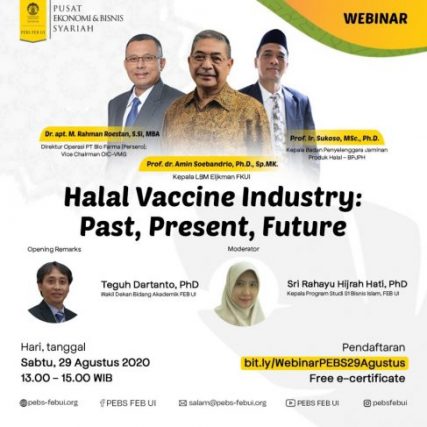Webinar PEBS FEB UI, “Halal Vaccine Industry: Past, Present, Future”
DEPOK – (29/8/2020) The Center for Islamic Economics and Business (Pusat Ekonomi dan Bisnis Syariah, PEBS), FEB UI, on Saturday, 29 August 2020, held a webinar titled “Halal Vaccine Industry: Past, Present, Future” to contribute to the discourse on vaccine development.
The webinar brought together three speakers, Prof. dr. Amin Soebandrio, Ph.D., Sp.MK., Head of LBM Eijkman Institute for Molecular Biology (LBM Eijkman), Faculty of Medicine, UI; Prof. Ir. Sukoso, M.Sc., Ph.D., Head of Halal Products Certification Agency (Badan Penyelenggara Jaminan Produk Halal, BP JPH); and Dr. apt. M. Rahman Roestan, S.Si., MBA, Director of Operations, PT Bio Farma/ Vice Chairman OIC-VMG. The webinar was moderated by Sri Rahayu Hijrah Hati, Ph.D., Head of the Undergraduate Program in Islamic Business Studies, FEB UI.
Rahmatina Awaliah Kasri, Ph.D., Head of PEBS, FEB UI, opened the webinar. Teguh Dartanto, Ph.D., Vice Dean, Academic Affairs, FEB UI, gave a welcome speech highlighting the fact that vaccines are currently a hot topic and highly anticipated. He drew attention to the important aspects of vaccines, namely their social, anthropological and religious contexts. Therefore, if Indonesia can produce halal vaccines, it can become a leader in the halal vaccine industry.

Amin Soebandrio, the first speaker, said there are several important issues regarding vaccine development, including safety and efficacy. Another important factor is approval by regulators and public acceptance. Thus, it is important for Indonesia to develop halal vaccines. There is also the vaccine dilemma and penalties imposed on parents who fail to have their children vaccinated. Amin also explained the types of vaccines, stages in vaccine production, and the Covid-19 vaccine being developed by LBM Eijkman.

Sukoso, the second speaker, explained the timeline of halal certification in Indonesia. Starting on 17 October 2019, halal certification is mandatory according to Article 4, Law No 33 Year 2014. A new era was ushered in when the halal certification process was conducted under the coordination of the Indonesian Council of Ulama (MUI), the Halal Products Certification Agency (BPJPH), and Halal Inspection Agencies (Lembaga Pemeriksa Halal, LPH). The basic principles of halal certification are traceability, namely products that are halal by nature, and products declared as haram as defined in Articles 18 and 20 of the law. He also threw light on the procedure for obtaining halal certificates and the phasing of halal certification for various products as stipulated in Religious Affairs Ministerial Regulation (Peraturan Menteri Agama, PMA) No. 26 Year 2019. He added that Muslims could play a role in halal certification and stressed the importance of international cooperation in the implementation of halal product assurance law.
Rahman Roestan, the third speaker, briefed the audience about the role of state pharmaceutical holding companies. Bio Farma, for example, will focus on life science products. He also explained the difference between conventional drugs and biologics. According to Rahman, vaccines are biologics given to healthy people. The first vaccine was developed by Turkish scientists during the Ottoman period to prevent smallpox, he said.

The development of the Covid-19 vaccine is led by Eijkman, supported by R&D officials of the Ministry of Health and Bio Farma through coordination of the Ministry of Research and Technology-National Research and Innovation Agency (Ristek-BRIN). Rahman also talked about halal issues in vccine and drug development, the global challenges and opportunities and recomendations for a roadmap for national halal pharmacy. (lem)










